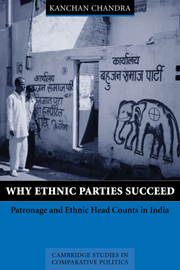Book contents
- Frontmatter
- Dedication
- Contents
- List of Maps, Figures, and Tables
- List of Abbreviations
- A Note on Terminology
- Acknowledgments
- 1 Introduction
- Part I Theory
- 2 Limited Information and Ethnic Categorization
- 3 Patronage-Democracy, Limited Information, and Ethnic Favourit
- 4 Counting Heads: Why Ethnic Parties Succeed in Patronage-Democracies
- 5 Why Parties Have Different Ethnic Head Counts: Party Organization and Elite Incorporation
- Part II Data
- Appendix A Elite Interviews
- Appendix B Ethnographies of Election Campaigns
- Appendix C Content Analysis
- Appendix D Description of Survey Data
- Appendix E Description of the Ecological Inference (EI) Method
- Appendix F Method Used to Estimate Ethnic Voting Patterns
- Bibliography
- Index
- Miscellaneous Endmatter
3 - Patronage-Democracy, Limited Information, and Ethnic Favourit
from Part I - Theory
Published online by Cambridge University Press: 19 October 2017
- Frontmatter
- Dedication
- Contents
- List of Maps, Figures, and Tables
- List of Abbreviations
- A Note on Terminology
- Acknowledgments
- 1 Introduction
- Part I Theory
- 2 Limited Information and Ethnic Categorization
- 3 Patronage-Democracy, Limited Information, and Ethnic Favourit
- 4 Counting Heads: Why Ethnic Parties Succeed in Patronage-Democracies
- 5 Why Parties Have Different Ethnic Head Counts: Party Organization and Elite Incorporation
- Part II Data
- Appendix A Elite Interviews
- Appendix B Ethnographies of Election Campaigns
- Appendix C Content Analysis
- Appendix D Description of Survey Data
- Appendix E Description of the Ecological Inference (EI) Method
- Appendix F Method Used to Estimate Ethnic Voting Patterns
- Bibliography
- Index
- Miscellaneous Endmatter
Summary
This chapter builds upon the link between limited information and ethnic categorization to develop a theory of individual decision making among benefit-seeking voters and office-seeking elites in patronage-democracies. Confronted with competing elites, how does a voter in a patronagedemocracy decide who is most likely to channel benefits to him individually? And confronted with different strategies for the distribution of benefits, how does an individual elite seeking to build a following decide whom to target? The voting decision in patronage-democracies, I argue, typically approximates a situation in which observers (voters) are forced to distinguish between individuals (the recipients of past patronage transactions) under severe information constraints. These severe information constraints produce a self-enforcing and reinforcing equilibrium of ethnic favouritism: voters expect co-ethnic elites to favour them in the distribution of benefits, and elites expect co-ethnic voters to favour them in the distribution of votes (see Figure 1.1, p. 12).
The tendency of patronage politics to go hand in hand with expectations of ethnic favouritism has been noted in other theoretical and empirical work. According to Kearney, a student of Sri Lanka: “A common expectation seems to be that a person holding a public office or other position of power will use his position for the near-exclusive benefit of his ‘own’ people, defined by kinship, caste, ethnic community or personal loyalty.” According to Haroun Adamu, a student of Nigerian politics: “It is strongly believed in this country that if you do not have one of your own kind in the local, state and/or national decision-making bodies, nobody would care to take your troubles before the decision makers, much less find solutions to them.” Kenneth Post's description of elections in Nigeria emphasizes much the same point:
It was rare for a man to stand for election in a constituency which did not contain the community in which he was born. It did not matter if he had been educated elsewhere and had his business interests outside the community in which he was born, so long as he regarded it as his home. He would still be a better representative for it than someone who came from outside, who could not even speak in the same tongue.
- Type
- Chapter
- Information
- Why Ethnic Parties SucceedPatronage and Ethnic Head Counts in India, pp. 47 - 81Publisher: Cambridge University PressPrint publication year: 2004



